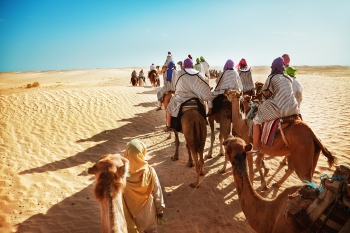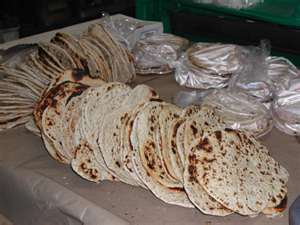
 |

Thus, in the middle of the night, é‑‑ä struck all of the firstborn-males in ërꞋëtz Mi•tzᵊraꞋyim, from the firstborn-male of the reigning Par•ohꞋ to the firstborn-male of the inmate in the prison-hole; and every firstborn-male of the livestock. When Par•ohꞋ got up in the night, he and all of his a•vâd•imꞋ, along with every other Egyptian, there became a great wailing in Mi•tzᵊraꞋyim because there wasn't a household that wasn't suffering from a dead firstborn-male.
Then, Par•ohꞋ summoned Mōsh•ëhꞋ and A•ha•ronꞋ that same night, saying, "Get up and get out from among my am; you and Bᵊn•eiꞋ-Yi•sᵊrâ•eilꞋ. Go! Do a•vōd•âhꞋ for é‑‑ä as you said. Take both your tzōn and your cattle, as you said, and get out! Bless me while you're at it!".
Then the Mi•tzᵊraꞋyim pressured the am hard to propel them speedily out of Mi•tzᵊraꞋyim, saying that otherwise, "We're all gonna die!"
So the am picked up their dough before it could yë•khᵊmâtzꞋ, with their pouches of sourdough starter stock bound in backpacks.
Then Bᵊn•eiꞋ-Yi•sᵊrâ•eilꞋ did as Mōsh•ëhꞋ had directed: asking local Mi•tzᵊraꞋyim for utensils of silver and gold and clothes.
So é‑‑ä bestowed the am with the acquiescence of the Mi•tzᵊraꞋyim. And Bᵊn•eiꞋ-Yi•sᵊrâ•eilꞋ asked and exploited Mi•tzᵊraꞋyim.
 |
So Bᵊn•eiꞋ-Yi•sᵊrâ•eilꞋ (about 600,000 army-aged soldiers, beside the toddlers) caravanned from Pi-Tōm![]() to Suk•otꞋ along with an innumerable eiꞋrëv rav; plus their tzōn, their cattle – very substantial property.
to Suk•otꞋ along with an innumerable eiꞋrëv rav; plus their tzōn, their cattle – very substantial property.
 |
| Ancient-style (soft) matz•ōtꞋ flatbread |
Along the way, they baked the dough that they had brought out of Mi•tzᵊraꞋyim – matz•otꞋ flatcakes (because there was no time to allow the dough to khâ•meitzꞋ because they were driven-out![]() from Mi•tzᵊraꞋyim and couldn't dawdle. Neither did they have time to make provisions.
from Mi•tzᵊraꞋyim and couldn't dawdle. Neither did they have time to make provisions.
So Bᵊn•eiꞋ-Yi•sᵊrâ•eilꞋ lived as a mo•shâvꞋ in Mi•tzᵊraꞋyim 430 years. At the cut-off of the 430 years, in that very day, all of the Tzᵊvâ•ōtꞋ é‑‑ä made Yᵊtzi•âhꞋ from ërꞋëtz Mi•tzᵊraꞋyim.
It was é‑‑ä's night of watch-guarding for all of Bᵊn•eiꞋ-Yi•sᵊrâ•eilꞋ, to be watch-guarded throughout our generations. And é‑‑ä told Mōsh•ëhꞋ and A•ha•ronꞋ,
“This is the khōq of PësꞋakh. No nâ•khârꞋ shall eat of it – neither settler nor employee. But every indentured ëvꞋëd-man shall undergo Bᵊrit Mil•âhꞋ and then eat of it.
It must be eaten in one house. Commemorating the secrecy from Par•ohꞋ's mutilators, you may not carry any of the bâ•sârꞋ outside of the house. Neither shall you break any bone of it.
“The entire Ad•atꞋ Yi•sᵊr•â•eilꞋ shall do it.
“Whenever a geir yâ•gūrꞋ among you, then he shall make PësꞋakh. Administer the Bᵊrit Mil•âhꞋ to every male of his. Then he shall approach and do PësꞋakh too. Then he shall be as an Israeli born-Jew. But no uncircumcised male shall eat of it.
“One Tor•âhꞋ shall be applied – to the Israeli born-Jew and to the geir ha-gârꞋ among you.”
And all Bᵊn•eiꞋ-Yi•sᵊrâ•eilꞋ did so. When é‑‑ä commanded Mōsh•ëhꞋ and A•ha•ronꞋ they, too, did so.
So it was that, this very day, é‑‑ä made the Yᵊtzi•âhꞋ of Bᵊn•eiꞋ-Yi•sᵊrâ•eilꞋ from ërꞋëtz Mi•tzᵊraꞋyim, on their tzᵊvâ•ōtꞋ.
Then é‑‑ä spoke to Mōsh•ëhꞋ, telling him,
“Sanctify to Me every firstborn-male initiator of every womb among Bᵊn•eiꞋ-Yi•sᵊrâ•eilꞋ – both man and livestock, they belong to Me.”
By not eating khâ•meitzꞋ, remember how hurriedly you made Yᵊtzi•âhꞋ out of ërꞋëtz Mi•tzᵊraꞋyim on this day, out of the house of corvée-a•vâd•imꞋ; because by a strong arm é‑‑ä made Yᵊtzi•âhꞋ for you from there. Today you make Yᵊtzi•âhꞋ; in Av•ivꞋ.
When é‑‑ä shall bring you into the ërꞋëtz occupied by the Kᵊna•an•imꞋ, the Khit•imꞋ,
the Ë•mor•imꞋ, the Khi•wimꞋ
and the Yᵊvus•imꞋ,
which He swore to your patriarchs to give you, ËrꞋëtz zâvatꞋ khâ•lâvꞋ ū-dᵊvâshꞋ, you shall â•vadꞋ this a•vōd•âhꞋ in this khōꞋdësh. Seven days shall you eat matz•ōtꞋ, and the seventh day shall be a Khag for é‑‑ä. Matz•ōtꞋ shall be eaten the seven days. Khâ•meitzꞋ belonging to you must not even be seen. Neither may sᵊōr belonging to you be seen within any of your borders!
So you shall relate to your son in that day, saying, 'It's because of what é‑‑ä did for me, when I made Yᵊtzi•âhꞋ from Mi•tzᵊraꞋyim.'
Thus it shall belong to you: a symbol on your arm, and a meme between your eyes that the Tor•âhꞋ of é‑‑ä be in your mouth. Because it was by a strong arm that é‑‑ä made Yᵊtzi•âhꞋ from Mi•tzᵊraꞋyim for you. Therefore, you shall watch-guard this khōq for its Mō•eidꞋ, from its days of days.
When it shall become that é‑‑ä shall bring you into ërꞋëtz of the Kᵊna•an•iꞋ as He swore to you and your patriarchs, so He shall give it to you.
So you shall transfer to é‑‑ä every initiator of the womb, including your livestock, that are males, which belong to é‑‑ä.
And every initiator donkey you must pâd•âhꞋ with a sëh. Either you pâd•âhꞋ it or break its neck. And you must pâd•âhꞋ every human initiator among your sons.
So it shall be that when your son asks on the morrow, "What is this?" Then you shall answer him,
'By strength of arm, é‑‑ä made Yᵊtzi•âhꞋ out of Mi•tzᵊraꞋyim, from the house of corvée-a•vâd•imꞋ. But Par•ohꞋ became hard against sending us away.
So é‑‑ä killed all of the firstborn-males in ërꞋëtz Mi•tzᵊraꞋyim, from the human firstborn-male to the firstborn-male of the livestock. Consequently, I make a sacrifice to é‑‑ä of all initiator-males except my firstborn son—whom I pâd•âhꞋ.'
So it shall be for a sign on your arm, and for tō•tâph•ōtꞋ between your eyes; because it was by strength of arm that é‑‑ä made Yᵊtzi•âhꞋ for us from out of Mi•tzᵊraꞋyim."

Optional parental preparation:
Can the child (you?) recite from memory the Mak•ōtꞋ (Hebrew terms) so far? … ,ãÌÈí
How many is 600k? (How to illustrate how big this number really is? Suggestion: ≈ the number of hairs on the heads of 6 people who have full heads of hair.)
What was an indentured servant? How does that differ from today's employee contract?
What is a sojourner?
What is circumcised v uncircumcised?
What does "corvée" mean?
What is a meme?
Dating – This verse is the reason why simplistic arts-degreed theologians, historians, archeologists and clerics – insisting the Bible couldn't be wrong (while considering their interpretations infallible) – have consistently wrongly dated the Yᵊtzi•âhꞋ two centuries after the event to c BCE 1450, the reign of Ra-moses Jr. the Great.
Pi-Tōm was originally built c BCE 1655-22, by corvéed Hebrews, under Men-kheper Ra Tut-moses 3rd (18th Dynasty), as his new capital.
Two centuries later, c BCE 1450, Ra-moses Jr. the Great renovated the city, renaming it after himself: Pi Ra-moses (shortened and Hellenized to "Ramses"; later Avaris, modern Qantir).
When the branch of the Nile servicing Pi Ra-moses dried up, ca. B.C.E. 1047, Par•ohꞋ Ah-kheper-Ra Setep-en-Amun![]() , who reigned approx. 46 years, moved the city, stone by stone, 20 km north to another, flowing, tributary of the Nile at Djanet (modern Tanis). (Chronology Of The Tanakh, From The "Big ðÀèÄéÌÈä" Live-LinkT
, who reigned approx. 46 years, moved the city, stone by stone, 20 km north to another, flowing, tributary of the Nile at Djanet (modern Tanis). (Chronology Of The Tanakh, From The "Big ðÀèÄéÌÈä" Live-LinkT ![]() ).
).
13.4 confirms that codification of this Scripture post-dates the Babylonian Exile.
Thus, 12.37 only proves that the earliest ms. from which this verse was copied dates no earlier than c BCE 1450, after which time everyone knew the city by the later name. Enough time had passed that referencing the earlier name from the time of the Yᵊtzi•âhꞋ, if the scribe even knew it, would no longer have been clear to readers.![]()
Questions you might anticipate that your child might raise and be prepared to discuss:
What does "dawdle" mean?
What is a settler?
What is an employee?
What does commemorate mean?
What is a symbol?
What are patriarchs?
What is an initiator?
What does "morrow" mean?
![]()
 |
 |